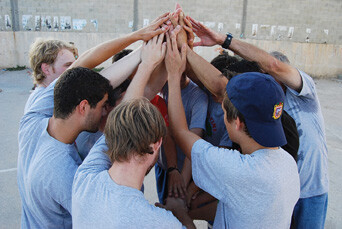
The Wall: In Jayyous, dreaming of flight
Greetings and peace to you from Jerusalem.
In July, I traveled with a group from our weekly Wednesday night volleyball group to the village of Jayyous in order to play against - I promise I'm not joking - the Palestinian championship team. Seriously.
 Our motley crew went to take on the best volleyball team in Palestine. They went easy on us, and we managed to hold our own enough to lose in a relatively unembarrassing fashion. Well, it was a little embarrassing.
Our motley crew went to take on the best volleyball team in Palestine. They went easy on us, and we managed to hold our own enough to lose in a relatively unembarrassing fashion. Well, it was a little embarrassing.
The normality of the situation was what makes it stand out the most in my mind. Here we were, participating in what is - at least in my church upbringing - one of the most normal fellowship activities in existence, a game of volleyball.
But underneath the fun and the friendship, there is sadness to this story. Jayyous is a deeply isolated village. It should be a quick 20-minute drive to the beach from Jayyous, a quick trip to the nearest city of Qalqilya, a brisk walk out to the olive groves and other agricultural land that have sustained the people of Jayyous for generations.
But slicing across the land of Jayyous, cutting it off from the sea and from the rest of the West Bank, is an apartheid wall, built and maintained by the Israeli military - a key aspect of the ongoing occupation of the Palestinian 'territories.'
As in most rural areas, the Wall in Jayyous consists of two large fences, equipped with electronic sensors, military watchtowers, and roll after roll of barbed wire. Between the fences is a military patrol road. Red signs warn, in three languages, that entering between the fences is a quick way to get shot.
In order to farm their land, residents of Jayyous have to apply for a permit from the Israeli military, a permit which is rarely granted and even more rarely respected. The last time I was in Jayyous I spoke to a woman who had a permit. She had been sitting at the yellow agricultural gate through the Wall, waiting to be let in, for four hours. Military jeeps drove by, but none stopped to open the gate.
The route of the Wall through the West Bank has been declared illegal by the International Court of Justice. But the Israeli government has ignored the ruling, and even in cases where the Israeli court has ruled against a particular part of the route of the Wall, the military has refused to dismantle it or move it.
But what can the people of Jayyous do? They could take a cue from other villages that have protested the route of the Wall, such as the village of Bil'in, which holds a weekly demonstration against the Wall and the Israeli settlements being built on their land. I was in Bil'in on July 4, and when our group of international, Israeli, and Palestinian activists approached the Wall, we were chased away with sound grenades, tear gas and rubber bullets. (By the way, if you haven't been tear gassed....don't be. It's no fun.)
Or they could stay in Jayyous, surrounded by a Wall not of their own making, cut off from the rest of the world. A world that stays silent. That allows a Wall that divides human from human, child of God from child of God, farmer from field, and the people of Jayyous from peace and justice, to continue being built despite its illegality and its destructive effects.
I wonder what role this dilemma plays in Jayyous having a championship volleyball team.
Is it any wonder that an activity that gives you such a sense of control and power would be popular? And that this activity would involve athletic leaps, precious seconds in the air? Perhaps I am imagining things.
But perhaps there is something vitally important to the people of Jayyous in being able to dream of leaping, of soaring, of flying. Over the Wall. Over their land. Over the siege. Over the settlements. Over the army. And being able to powerfully drive home some sort of point.
There is just something different about volleyball in Jayyous, where one has every reason to dream of flying.
WHAT CAN YOU DO?
1.. Continue praying for peace in this land. Pray for Palestinians and Israelis, that they may find justice, peace, and reconciliation.
2. Learn about the Apartheid Wall. Read the International Court of Justice ruling against the wall and the resources produced by the United Nations (www.ochaopt.org, under the heading "West Bank Barrier") and the Stop the Wall campaign (http://stopthewall.org). Consider holding an educational event about the Wall. Some people have included walls in their nativity scenes to emphasize the fact that Bethlehem, the city of Jesus' birth, is now an open air prison, surrounded by the Wall.
3. For information on divestment in a United Methodist context, see www.unitedmethodistdivestment.com. Also, see www.investinpeace.org to see the widespread support for divestment campaigns.
David Hosey is a member of Baldwin Memorial UMC in Millersville.

Login/Register to leave comment